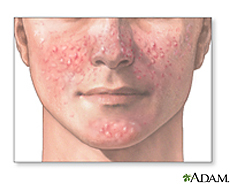Health Problems
Subscribe Newsletter
Medications - Acne

Wondering what are the Medications to eliminate Acne?
Our Ayurveda experts are working on simple and effective Medications to eliminate Acne. Meanwhile you can learn about the Medications Formulations from Acne by clicking here
Acne treatments work by reducing oil production, speeding up skin cell renewal, fighting bacterial infection, reducing the inflammation or doing all four. With most prescription acne treatments, you may not see results for four to eight weeks, and your skin may get worse before it gets better.
Your doctor or dermatologist may recommend prescription medication you apply to your skin (topical medication) or take by mouth (oral drugs). Oral prescription acne should not be used during pregnancy, especially during the first trimester.
Types of acne treatments include:
- Over-the-counter topical treatments. Acne lotions may dry up the oil, kill bacteria and promote shedding of dead skin cells. Over-the-counter (OTC) lotions tend to be mild and include benzoyl peroxide, sulfur, resorcinol, salicylic acid or sulfur as its active ingredient. These products can be very useful for mild acne. OTC acne can cause initial side effects - such as skin irritation, dryness and peeling - often improved after the first month of therapy.
- Topical treatments are available by prescription. If your acne does not respond to OTC treatment, consider visiting a doctor or dermatologist to get a stronger prescription lotion. Tretinoin (Avita, Retin-A, etc.), adapalene (Differin) and tazarotene (Tazorac, Avage) are examples of topical prescription products derived from vitamin A. They work by promoting cell renewal and prevent blockage of the hair follicles. A number of topical antibiotics also available. They work by killing excess skin bacteria.
Often, a combination of products needed to achieve optimal results. A number of antibiotics and benzoyl peroxide combined preparations available, including various dose combinations of benzoyl peroxide and clindamycin (BenzaClin, Duac, Acanya) and benzoyl peroxide and erythromycin (Benzamycin). Dapsone gel (Aczone) is a new acne treatment, it is particularly effective in the treatment of inflammatory acne. Recipe topical acne treatments can cause skin side effects such as stinging, burning, redness, or peeling. Your doctor may recommend measures to minimize these side effects, including using a gradually increasing dose, flushing drugs after a short application or switching to another drug.
antibiotics for moderate to severe acne, you may need a short course of oral antibiotics prescription to reduce bacteria and fight inflammation. Since antibiotics were first used to treat acne, antibiotic resistance has increased significantly in people with acne. For this reason, your doctor will probably recommend these drugs to decrease as soon as your symptoms begin to improve, or as soon as it becomes clear that the drugs do not help - usually within three to four months. In most cases, you will use topical medications and antibiotics together. Studies have shown that with the use of topical benzoyl peroxide along with oral antibiotics can reduce the risk of developing resistance to antibiotics. Antibiotics can cause side effects such as upset stomach, dizziness, or skin discoloration. These drugs also increase sun sensitivity of your skin and may reduce the effectiveness of oral contraceptives.
Isotretinoin For deep cysts, antibiotics may not be enough. Isotretinoin (Amnesteem, Claravis, Sotret) is a powerful medication available for scarring cystic acne or acne that does not respond to other treatments. This medicine is reserved for the most severe forms of acne. It is very effective, but the people who make it necessary to closely monitor the dermatologist because of the possibility of serious side effects. Isotretinoin is associated with severe birth defects, so it can not be safely taken by pregnant women or women who may become pregnant during treatment or within several weeks to conclude the treatment. In fact, the drug carries such serious potential side effects that women of reproductive age should participate in the Food and Drug Administration-approved monitoring program to receive a prescription for medication.
Isotretinoin often causes side effects - such as dry eyes, mouth, lips, nose, and skin, as well as itching, nosebleeds, muscle aches, sun sensitivity and poor night vision. The drug can also increase the levels of cholesterol and triglycerides in the blood, and may increase levels of liver enzyme.
In addition, isotretinoin may be associated with an increased risk of depression and suicide. Although it is a causal relationship has not been proven, doctors remain on alert for these signs in people who are taking isotretinoin. If you feel unusually sad or unable to cope, while taking this drug, tell your doctor immediately.
Oral contraceptives. Oral contraceptives, including a combination of norgestimate and ethinyl estradiol (Ortho Tri-Cyclen, Previfem, etc.) may improve acne in women. However, oral contraceptives may cause other side effects - such as headaches, breast tenderness, nausea and depression - what do you want to discuss with your doctor. The most serious potential complication is a slightly increased risk of cardiovascular disease, high blood pressure and blood clots.

